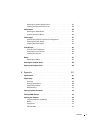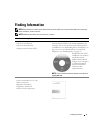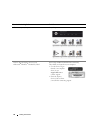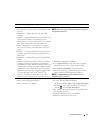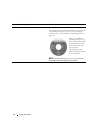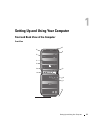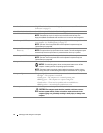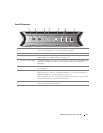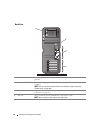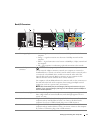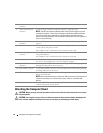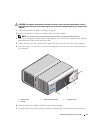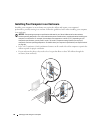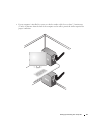
14 Setting Up and Using Your Computer
1 front I/O connectors Plug USB and other devices into the
appropriate connectors (
see "Front I/O
Connectors" on page 15).
2 3.5-inch drive bays (2) Can hold an optional Media Card Reader or floppy drive.
3-6 5.25-inch drive bays (4) Can hold an optical or SATA hard drive in a 5.25-inch drive bay carrier.
NOTE: The hard drive carrier is only for use in the 5.25-inch drive bays. The
floppy-drive/Media Card Reader and hard drive carriers are not interchangeable.
7 front panel LEDs (4) Use the sequence of these diagnostics lights to help troubleshoot a problem with
your computer (see "Dell Diagnostics" on page 72).
NOTE: The color of the front panel LEDs can be adjusted in system setup (see
"System Setup" on page 166).
8 optical drive tray eject
button (4)
Use to eject the drive tray of an optical drive.
NOTE: The optical drive tray eject button is not a handle. The self-tending doors open
automatically when the eject button is pressed and the drive tray is ejected.
9 front panel LEDs (4) Multi-colored lights provide illumination for the front of the computer.
NOTE: The color of the front panel LEDs can be adjusted in system setup (see
"System Setup" on page 166).
10 power button Press to turn on the computer.
NOTICE: To avoid losing data, do not use the power button to turn off the
computer. Instead, perform an operating system shutdown.
NOTE: The power button can also be used to wake the system or to place it into a
power-saving state (see "Power Management Options in Windows XP" on page 44).
11 power light The power light illuminates and blinks or remains solid to indicate different states:
• No light — The computer is turned off.
• Steady green — The computer is in a normal operating state.
• Blinking green — The computer is in a power-saving state.
• Steady amber — There may be a problem with an installed device.
• Blinking amber — An internal power problem may exist.
12 computer stand Attach the computer stand to provide stability to the system.
CAUTION: The computer stand should be installed at all times to ensure
maximum system stability. Failure to install the stand could result in the
computer tipping over, potentially resulting in bodily injury or damage to the
computer.




